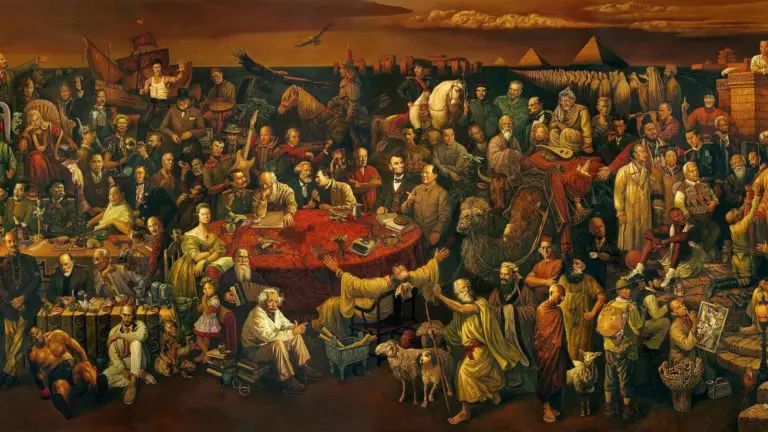The following text is excerpted from Enemy of the Disaster, the first English-language collection of essays by Renaud Camus, published by Vauban Books and released on October 15 in the U.S. and October 17 in Europe.
Enemy of the Disaster is the first authorized English translation of Renaud Camus’ political writings and includes his notorious 2010 speech, “The Great Replacement.” Though 42 years have passed since his work was last translated into English, Camus is endlessly and irresponsibly discussed in the media, his vast and complex oeuvre reduced to a single phrase devoid of all context. In the English-speaking world, at least, he is the opposite of an author; he is a floating signifier, a rumor, an element in someone else’s narrative.
This volume aims to change that. Spanning the years 2007-2017, its ten chapters present a very different Camus, one freed from the opportunistic glosses of ‘friend’ and foe alike. Instead of a conspiracy theorist, the reader discovers a committed opponent of conspiratorial thinking of all kinds. Instead of a proponent of rightwing terrorism, one discovers the founder of a political party devoted to the promotion of civic peace. Above all, one discovers in Camus a man of culture, of the high European culture that he sees everywhere in retreat amid a generalized debasement of humanity.
Enemy of the Disaster will prove a precious resource to any serious student of contemporary France. The issues it addresses, however—issues, not just of immigration and identity, but of culture, education, and the future of humanity itself—resonate well beyond the French context. These are issues with which we all, sooner or later, will need to reckon. By showing us what we have so blithely abandoned in our mad embrace of an increasingly posthuman future, Renaud Camus helps us do just that.
I was saying that one factor contributing to the Great Replacement is the permanent influx of newcomers, immigrants, and non-citizens and their massive presence across the country. Massive and often illegal, quite an odd combination, but no more so than the strange status of the aforementioned “undocumented” migrants who have broken the law since they officially have no right to be here but are here nonetheless and who—and this is the most extraordinary part of it—may lay claim to rights by virtue of the very fact that they have broken the law. From a logical and legal point of view alike, it is an astonishing situation given that the criminal act is here the source of rights. As it happens, these media-friendly illegal immigrants, who have the police against them (somewhat) but (media-political) power on their side, were quick to make a practice of blaming France and the French should anything unfortunate befall them. One even has the impression they are reading from a script they memorized upon or even before their arrival and that, however strange it seemed to them, these hateful diatribes, full of disgust, were what French journalists and officials expected and, moreover, always delivered the best results. One thinks of burglars who sue a landlord because they break a leg in his poorly lit stairwell or get an electric shock from contact with a loose socket not up to code. Alas, when it comes to immigration, the French are so used to this twisted, Rantanplan logic that it does not even surprise them anymore.
Yet observing that there has been a change of people requires us to venture onto more delicate terrain than the question of the latest and entirely provisional foreigners. I’m referring to the question of what a people is, a vast subject that we will not fully exhaust. In the thriving traffic in statistics relating to the Great Replacement, one of the most effective tools has an undeniable legal foundation. It takes refuge there, as one might take refuge in an impregnable fortress, and it is quite right to do so. For, to a certain degree, it is just that. I am speaking of the claim according to which there is only one kind of French person and its well-known and particularly fearsome polemical variant, that no one is more French than anyone else. Thus a veiled woman with a shaky command of our language, entirely ignorant of our culture and, worse yet, overflowing with vindictiveness and animosity, if not hatred, for our history and civilization will be perfectly able to say—and she usually does not miss the chance, particularly when she finds herself on television—to a native Frenchman with a passionate interest in Roman churches, the finer points of vocabulary and syntax, Montaigne, Jean-Jacques Rousseau, Burgundy wine, and Proust and whose family has for several generations lived in the same little valley of the Vivarais or Périgord, from which it has observed or suffered through the many twists and turns of our history, this veiled woman can thus perfectly well say and usually not in a very friendly way: “I am just as French as you are,” if indeed it’s not “more French”, as I believe I have heard on such occasions.
And legally speaking, if this person is of French nationality, she is perfectly right. It would certainly be unwise to contradict her, in any case. And yet it is absurd. More than that: it is oppressive. I will not go so far as to say that it is meaningless. But, to return to a distinction I explored at length in my book Du sens and which I borrowed from Plato’s Cratylus, I will say that this woman’s assertion has a Hermogenian meaning, that is, one of pure convention as Hermogenes asserts is true of the meaning of words in Plato’s dialogue. But it has no Cratylian meaning, that is, one long-inscribed in the archeology of vocables, indeed in their origin and the origin of this origin. Law can settle for Hermogenian meaning. I will even say that it must, for this is its grandeur, its sacrifice and nobility, like a priest who renounces the ways of the flesh. But life for its part, the life of the mind no less than that of society, cannot do so, and culture even less so, to say nothing of literature, which owes everything to Cratylus and nothing to Hermogenes apart from a few comic effects now and then. If this lady is right, being French is nothing: it is a mockery, a bad joke that has fallen flat, a rubber stamp on an administrative document. Understand me well: I am not saying that the rubber stamp is nothing. I have too much respect for language, for honoring one’s commitments, for the law to deny its legal import. But I believe that the law goes astray when it wanders too far from the reality of things, when it contradicts this reality, when it pretends to replace it, when, contrary to the literary sense of the world (which is in such bad shape), it sacrifices to Hermogenes as to a single god and refuses to acknowledge the least debt towards Cratylus.
It is hard to imagine but barely forty years ago Georges Pompidou still spoke—and at Sciences Po, no less!—of the genius of our race. Of our what? As we know, this word has long been taboo in our language despite having naturally flourished there without incident for several centuries, a word used by Léon Blum and Barrès, Victor Hugo and Racine, albeit each time with a slightly different meaning, so broad was its palette. The language police, a fearsome caste whose decrees cause more fear and trembling than a criminal court, only allow it the meaning given to it by patent, pseudo-scientific racists. And so they have banished it from the polity, from its radio waves and its galley proofs, without any consideration for the very deep and broad place it occupies in our language or the richness of its semantic range. And now we miss it. For as the immense majority of the world’s peoples perceive all too well, a people is also a race: by this I have in mind less a hypothetical community or biological kinship than a long-shared history. What I have in mind is more about culture and heritage than it is about heredity. To this I would also add desire, will, love. Individuals who so wish can always join a people out of love for its language, literature, its art de vivre,or its landscapes. But peoples who remain peoples cannot join other peoples. They can only conquer them, submerge them, replace them.
We have published a series of pieces to explore the ideas of Renaud Camus. The first was Anthony Daniel’s commentary published here, the second was by Pierre-Marie Sève here. Filip de Winter discusses Camus’ ideas in an interview here. We previously also published Rod Dreher’s birthday tribute to Camus here. We hope these various articles will reinvigorate discussion over immigration and its challenges today.
We hope to help raise awareness of his works, nearly all written in French, to coincide with the publication of the first English-language collection of essays by Camus, Enemy of the Disaster, released on October 15th in the United States and on October 17th in Europe and the rest of the world. Enemy of the Disaster can be ordered from Amazon or from the publisher’s distributor, Itasca Books.





